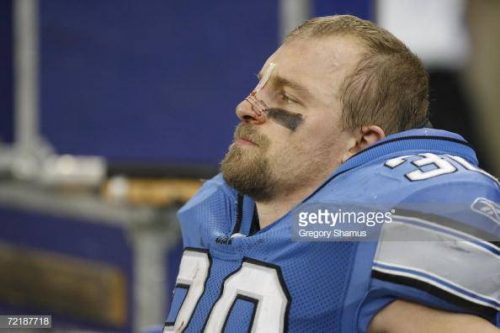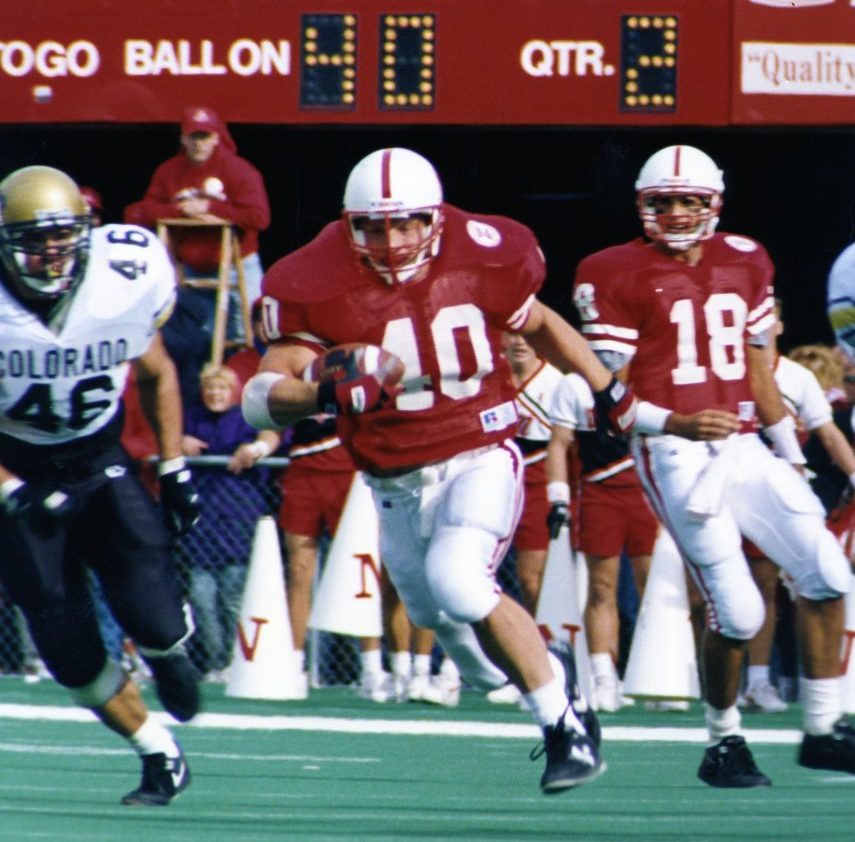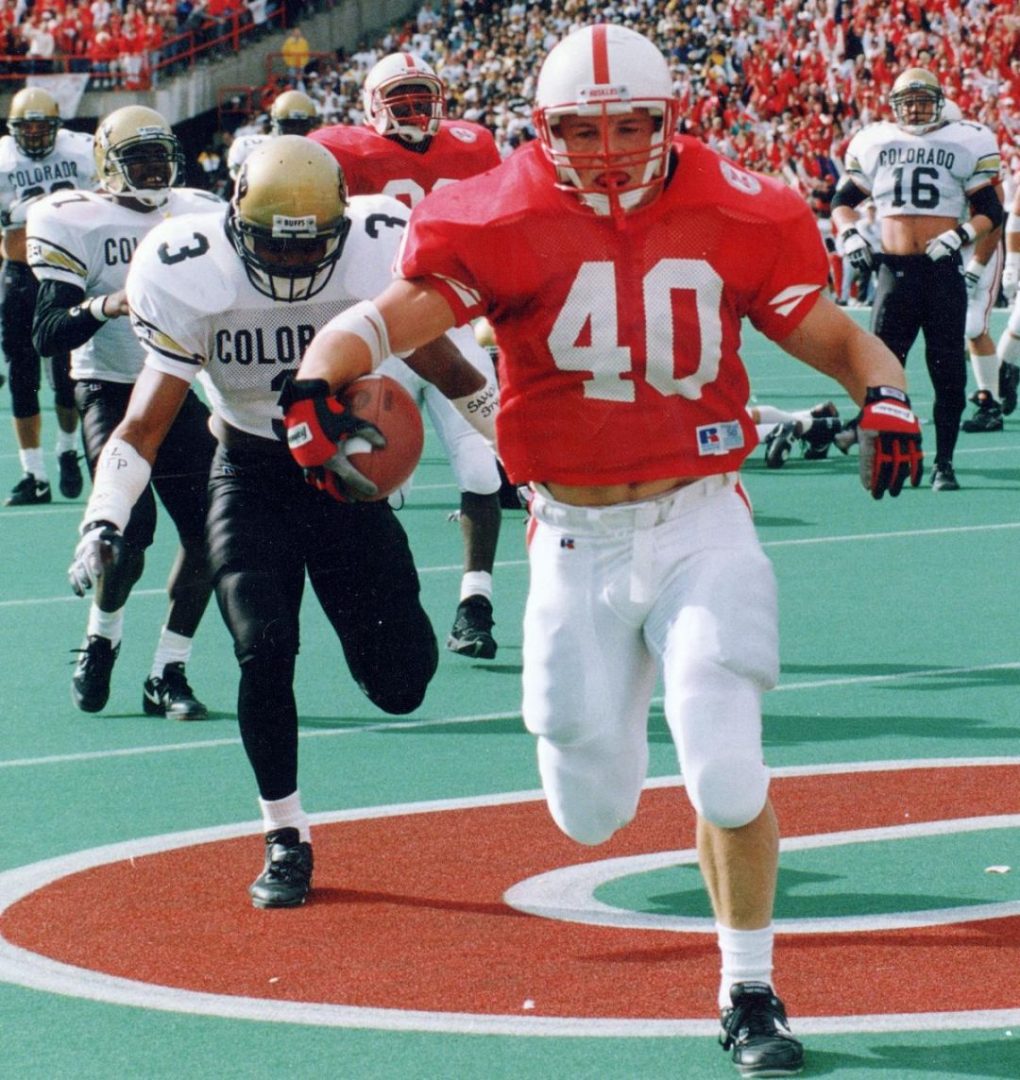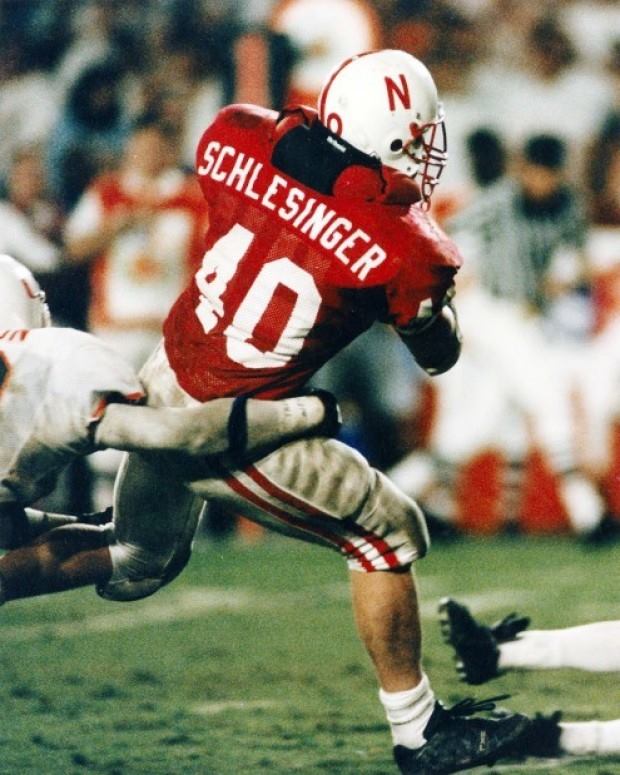Anatomy of an Era: Cory Schlesinger, Part 3

Excerpted from Chapter 48, No Place Like Nebraska: Anatomy of an Era, Vol. 1 by Paul Koch
Anatomy of an Era: Cory Schlesinger, Part 3
Q: What drove you and motivated you in the weight room?
CS: I never even dreamt of getting that (Lifter of the Year) award. I guess my teammates saw me differently…they saw how hard I worked in the weight room and how hard I ran in winter conditioning. It was almost like a drug of wanting to improve and get better. And that was the one place to do it, because you could see the progression of getting stronger and getting faster, you just keep wanting more and more of it.
It also helped that we had a great strength staff. That’s another thing, they knew how to get the best out of us, and we were just performing at that level. The crew that was there, Randy Gobel, Bryan Bailey, Mike Arthur and, of course, Boyd, those guys really stuck out to me. To me, Boyd knew what we needed to do. He just had that personality of, “I’m gonna get the best guys in there to make us the best program.” And he wasn’t out there really coaching us, but he knew how to get the best guys to get us to be the best, and that is what I remember.
I remember talking to him on my official visit. I guess it was out in that trailer, while they were redoing the weight room, and he was asking me how much I do on this lift or that. And I didn’t even have any numbers, I was kind of making them up off the top of my head; I didn’t know, really. (laughs) But he was just like, “This is what we’ll want you to do. This is what you’ll become and this is how fast you’ll become,” and I was like, ‘Really? Well, yeah! This is great!’ (laughs)
Q: He shone some headlights down the road and gave you a vision of the plans he had in mind for you?
CS: Yes, he basically had a plan. He knew and had confidence in his staff and his program. He knew, “Hey, if you do 225, we’ll have you doing 345 in no time.” He just knew his program was successful and it would work to improve all his players. And I don’t know if he saw the frame I had and, “You’ll get some meat on that body easily. And it’s going to be dense, and when you hit somebody it’s just going to be a thud.” But he had the vision. He had the vision and he knew how to share it.
Q: Boyd was always a good salesman, Cory. And he said it in such a confident way that you couldn’t help but believe him, right?
CS: Oh yeah. It wasn’t, “What do you want to get?” It was like, “This is how you’re gonna do. You’re gonna do this and this, and this is how fast you’re gonna be.” And it was like, ‘Wow,’ and you believed it. And then you went out there and it became, ‘I’m gonna prove it.’

On the run vs. Colorado, 1994 (Unknown/uncredited)
Q: Do you recall the very first game you played in?
CS: Yeah, it was my sophomore year, and like I said, going out in front of the ‘Sea of Red.’ That was probably my first game out there. It was just how small the stadium felt my first game day. I don’t remember if I played or who we played at all. I just wanted to go hit somebody. (laughs)
Q: Sounds like a typical fullback. (laughs) Can you explain the perverse joy and gratification it gave you to blow somebody up like you guys did?
CS: The most satisfying thing was the things that no one else saw. That you knew it happened and that guy you hit knew it happened, but no one else saw it, because they all looked at the running back or whomever. No one saw what actually happened, but it was my block that got him open, and it was my block that that linebacker is gonna remember. And he knows it’s going to come again and again and again. (laughs)
Q: And speaking of ‘again and again and again’, anything about that Miami game stand out to you about those guys?
CS: No, not really. I just remember the confidence we had. There was no one that had doubts. It was just the confidence we had in Coach Osborne and each other, and just the way we looked at each other and were like, ”Man, we’re just gonna do this.” No one had their head down and no one looked nervous. It was just, “We’re gonna go do this! Let’s bring that trophy back and let’s not stop!” The confidence was there at halftime. We were down, but we were excited to go out there and play. That’s just the feeling that we had, and how everyone looked in the locker room: “Let’s just go out there and play and win this game.” That’s the one thing that stuck out the most: the look in everyone’s eyes that we were going to finish it. The Unfinished Business.
Q: What did the ’94 Orange Bowl do for you? Any recollections of that game?
CS: I don’t think anybody really gave us a chance in that game, and we went out there and proved that we could do it.
Actually, I almost hate to say it, but that was the beginning. It was almost better that we lost that game. I hate to say that, because the guys that were seniors missed out on the opportunity that we had. But the guys the next year? I remember during training camp it was just like, “Man, we are ready to go.” It was just amazing how the confidence was. People were practicing hard and not really joking. Almost joking, but it was like, “Let’s get back to the huddle and do it again. Let’s do that again.” I remember standing in the huddle outside that end zone thinking, ‘Wow, this is the year. Everything is in place. The Unfinished Business…it’s time to finish that thing.’
Q: That game gave you guys a lot of confidence in knowing that you could finish it, that you had what it took?
CS: Yeah, definitely. It took us to the point that we knew we were going to take it home.

Schlesinger scores vs. Colorado, 1994. (Courtesy Columbus Telegram)
Q: Do you think we got hosed in that Florida State game with some calls?
CS: Oh, probably. Yeah. We looked at it again. We got hosed. But you know what? We should not have even allowed it to get that close anyway. That was our mentality: “Don’t let the referees decide the game. We should go out there and destroy them. They shouldn’t even make it that close.”
Q: And what about the offensive linemen? I’m sure you have some things to say about those guys, being a blocker yourself?
CS: Oh definitely. We’re just glorified linemen, I guess. We’re linemen in the backfield. Especially when you go to Detroit your first year, definitely didn’t touch the ball there.
Q: And what about your running mates?
CS: All my running backs where great guys, there’s no one I could ever say I liked better than the others. We had a group of guys that just worked great together. They supported one another and they made each other accountable and they worked hard. And Lawrence Philips, he was a great guy to block for. Even in practice, he would give you that confidence and tell you ‘good job’ when you made a good play. In practice even. He and I were so in touch with each other. He knew what I was going to do. He had the confidence, “I know what Cory’s going to do here.“ He knew I was gonna do my job. The trust.
I remember looking back on Scott Baldwin… I don’t know if anyone has brought up his name. I remember him, he was a stud. I tell you what, I loved watching him run the ball. I remember one time on a kickoff return, he was in the front line and turned around and just lit this guy up. I saw that and I’m like, ‘That’s Nebraska football! That’s what I want to get to! The point where I can hit somebody and knock them backwards like he did!’ He was a good character. I hated to see how everything turned out for him. I would have loved to see how he performed.
Q: Who behind the scenes played a huge role for you or the team?
CS: The strength staff, definitely.

(Courtesy Nebr. Sports Info)
Q: And Coach Osborne, how would you say he affected you as a person and a player?
CS: Well, what I liked about him: if you did see him in the hallway he’d always be sure to acknowledge you. But he’d never ask you about football, he’d ask you about school. Now, you had to make sure your grades were up, so when he did ask that, you had a good report. (laughs) You knew he was probably going to ask you about school, and that’s very important for these college students. You don’t want to say, ”Oh, I’m not doing very well.” (laughing)
Q: And looking back on it, almost 20 years removed, what do you treasure most?
CS: That’s a good question. Just the unity, the chemistry that we had together. Even when we had scout team guys, they just knew their job was to run the card right and simulate what‘s going to happen during the game. And I know there were a few hits out there, game-ready stuff, which is only gonna make us better. You practice like you’re gonna play in the game, and those guys had to sit there and endure the hits. And sometimes they gave them, too, which is also gonna make you better.
Q: Any most memorable practice?
CS: Every day! Someone was doing something every day in practice. Those fights were always fun, but I tried to avoid them because they were too tiring.
And you didn’t want to run stadium steps. That’s true.

Both volumes available on Amazon.com
Q: So if someone gave you a football team to start from scratch, what would you fall back on?
CS: Being a coach who’s not two-faced, I guess. A coach that believes in you, a coach that, if you have a beef with him, he says, “Bring it to me.” He’d never downgrade you behind your back. It gets around, players aren’t dummies. They know what’s said in meetings, but when you have a coach who truly believes in you and is gonna fight for you? That’s a man you want to play for.
Q: Was that preached, spoken verbally? Or did it just sense it?
CS: It was just how the guys in front of you practiced. You did not want to let them down, and you learned from the best, the older guys that were practicing hard. And the guys that weren’t? They usually got weeded out. They didn’t make it their whole college career. They didn’t hang with the guys who wanted to be the best. The guys who won the national championship were the best and they did what they were supposed to do. That’s what it comes down to: do what you’re supposed to do. You‘ve got a job, just do it. Don’t make an excuse or try to fake your way through it. Do what you’re supposed to do.
Q: So when you finally left the university and got drafted by Detroit, was there any one thing you missed more than another?
CS: Well, not really. My five years? I was ready to move on. My opportunity came and I had a ring, and I wanted to see how I would do at the next level. There were no regrets and it was time to move on to the next level. My time at Nebraska really prepared me for the next twelve.
Q: Wow, twelve years in the pros. That’s quite a career, man.
CS: Yep. 2006 was my last year. It was hard to hang it up, but your body at the same time was going, “Yeah, you’re not doing what you used to do.” (laughs) That’s kind of the hard part: you want to do it, but your body’s not doing it.

Carrying vs. Miami, 1995 Orange Bowl (Unknown/Uncredited)
Q: Thanks so much, Cory. Any last comments?
CS: I would say that the Husker fans are an amazing group of people. When you talk to other players that played in Memorial Stadium, they really loved playing there. It was just a great experience. Even after the game, no one spit on them or threw things at them. Even when they got smoked, they were, “Hey, good job out there today.” That is Nebraska football. “We’re gonna give you a licking, but we’re going to pick you up and say ‘good job.” I’ve heard from several players that we had the best fans. And I would say that they prepared me not only for life after college football, they also formed me for life after football…
Q: (laughs) And what about the Kansas State game when Matt Turman started?
CS: It didn’t matter who the quarterback was that day: we were going to run the ball and do what we were going to do. We knew the coaches prepared him. We went out there and did the job. We had to step it up a notch and do what we had to do. And we did. Our game plan changed a little bit. It was, “All right, we have four plays to run. We’re going to run them all game!”
End conversation.
“Those guys made each other accountable to play like they were going to play in the game on Saturday.’ Practice like you were going to play.’ And that’s what we did, we battled every day in practice.” No eloquency here, as Cory took us behind the scenes and into the minds of the bruisers laying the licks for paths of glory. There was a tough-minded, rugged individualism in the Husker fullbacks, and they reveled in it. So did we. Who among the fanatics of the day didn’t relish the vision of these hybrid behemoths tearing downfield open-throttle on a surprise trap play, ball crushingly cradled, blowing up linebackers and dragging DB’s along like mere piss ants on a pig? “..other guys on the team will be like, ‘Wow! Look at these running backs. We have to keep up with these running backs.’ We don’t have to say anything, it’s just by our actions.” Attitude and good ol’ work ethic hammered into their heads by Frank Solich, they rarely disappointed.
By and large the most home-grown of the position groupings, the Nebraska fullbacks’ exploits made them fan cult favorites. Other than Clinton Childs from Omaha (1995 population 681,000) and Chris Norris of Papillion (~22,000), the rest hailed from tiny, rural burgs like Duncan (~410), Brainard (~747), Battle Creek(~1,600), Fullerton(~1,500) and Clearwater/Elgin(~380/806). With determination and purpose, they were weightroom denizens: “It was almost like a drug of wanting to improve and get better. And that was the one place to do it, because you could see the progression of getting stronger and getting faster, you just keep wanting more and more of it.” It transferred well out onto the field, too, “That’s what it comes down to: Do what you’re supposed to do. You‘ve got a job, just do it.”
As for team concept, it was refreshing to hear Coach Solich’s championing unity by way of his, “When we do score we’re gonna go back and congratulate our offensive linemen, because they’re the ones who got us in there -and the wide receivers and the tight ends- because without them we’re not getting into the end zone.” The ‘Unity, Belief, & Respect’ mantra was lived out in celebration.
Notable quote #2:
Cory Schlesinger on fan sportsmanship: “Husker fans are an amazing group of people. When you talk to other players that played in Memorial Stadium, they really loved playing there… I’ve heard from several players that we had the best fans.”
Copyright @ 2013 Thermopylae Press. All Rights Reserved.
Photo Credits : Unknown Original Sources/Updates Welcomed